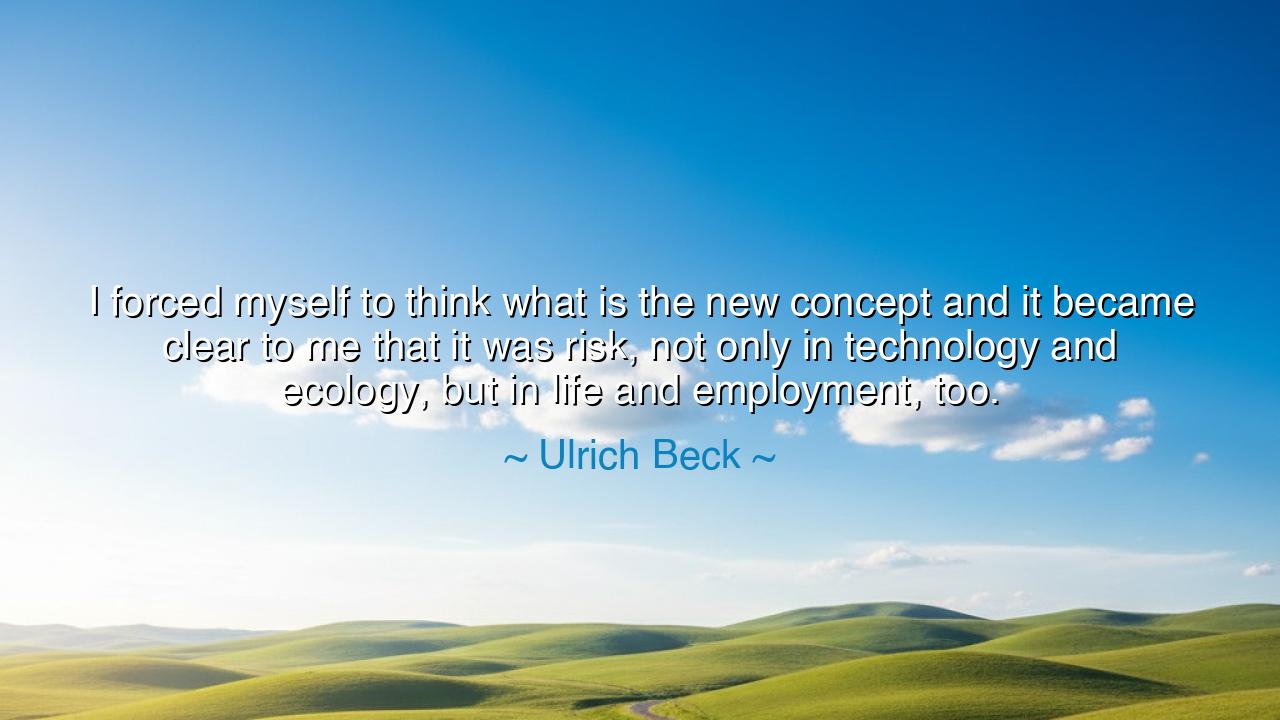
I forced myself to think what is the new concept and it became
I forced myself to think what is the new concept and it became clear to me that it was risk, not only in technology and ecology, but in life and employment, too.






Ulrich Beck, the philosopher of modern society, once declared with great insight: “I forced myself to think what is the new concept and it became clear to me that it was risk, not only in technology and ecology, but in life and employment, too.” These words emerge from his profound reflections in the late twentieth century, when the world began to awaken to dangers of its own making. Beck saw that the true defining force of our age is not merely progress, but the risk that comes hand in hand with it—the uncertainty, the peril, and the fragility that shadow every advance.
He reminds us that technology, though wondrous, carries risks that reach far beyond imagination. Nuclear power, though promising endless energy, brought with it the specter of catastrophe, as seen in Chernobyl and Fukushima. The internet, though weaving the world together, opened pathways of surveillance, manipulation, and disconnection. The ancients marveled at Prometheus stealing fire from the gods, but Beck shows us that modern man’s fire is not only creative—it is dangerous, burning with powers that can heal or destroy. Thus, to live in this age is to dwell in the tension between invention and its hidden costs.
So too in ecology Beck saw the looming perils. The industrial achievements of humankind brought prosperity, but also poisoned rivers, warmed the planet, and endangered countless species. Ancient peoples revered the earth as mother, fearing to wound her balance, but the modern world, intoxicated by speed and greed, often forgets. Beck warns us that the risk is not distant—it is here, woven into the air we breathe, the seas we cross, the soil beneath our feet. To ignore it is folly; to recognize it is the beginning of wisdom.
Yet he does not stop with machines or the natural world. He declares that life itself, in its daily course, has become entangled with risk. In earlier ages, communities were bound by tradition, labor, and faith; futures were more predictable, paths more fixed. But in the modern world, every choice is a wager. To move to a new city, to marry, to bear children, to choose a career—each is heavy with uncertainty, for the ground beneath us shifts ever more quickly. The life of modern man is no longer anchored in certainty but afloat on currents of risk.
And in employment, Beck saw the same truth. Where once trades were stable, passed from father to son, now jobs vanish with the turn of markets, replaced by machines or outsourced to distant lands. The worker, who once found security in lifelong labor, now must reinvent himself again and again. Here, too, risk reigns supreme—uncertainty not as an accident of life, but as its permanent companion. The new world is not a world of safety, but of constant adaptation.
History offers us a vivid mirror. Consider the Age of Discovery: sailors venturing into uncharted seas risked storms, starvation, and death. Yet without that risk, the maps of the world would never have been drawn, and civilizations would have remained apart. Just as Columbus or Magellan embraced risk to expand horizons, so too must the modern soul face the risks of technology, ecology, and employment with courage—not denying them, but mastering them through awareness and foresight.
Thus the lesson for us is plain. Do not seek a life free of risk, for such a life is an illusion. Rather, seek wisdom in managing it, courage in facing it, and patience in enduring it. Learn about the hidden costs of the tools you use, honor the earth that sustains you, adapt your skills to the shifting tides of labor, and embrace uncertainty as the price of growth. For as Beck teaches, risk is not an enemy to be destroyed, but a reality to be understood.
Therefore, O children of the future, take these words to heart: every age has its burden, and ours is the burden of risk. Walk not in fear, but in vigilance. Build not only machines, but safeguards. Chase not only profit, but sustainability. And live not in denial of uncertainty, but with the strength to transform it into opportunity. In this way, the risks of our age shall not consume us, but refine us into a generation both wiser and stronger than those before.






AAdministratorAdministrator
Welcome, honored guests. Please leave a comment, we will respond soon